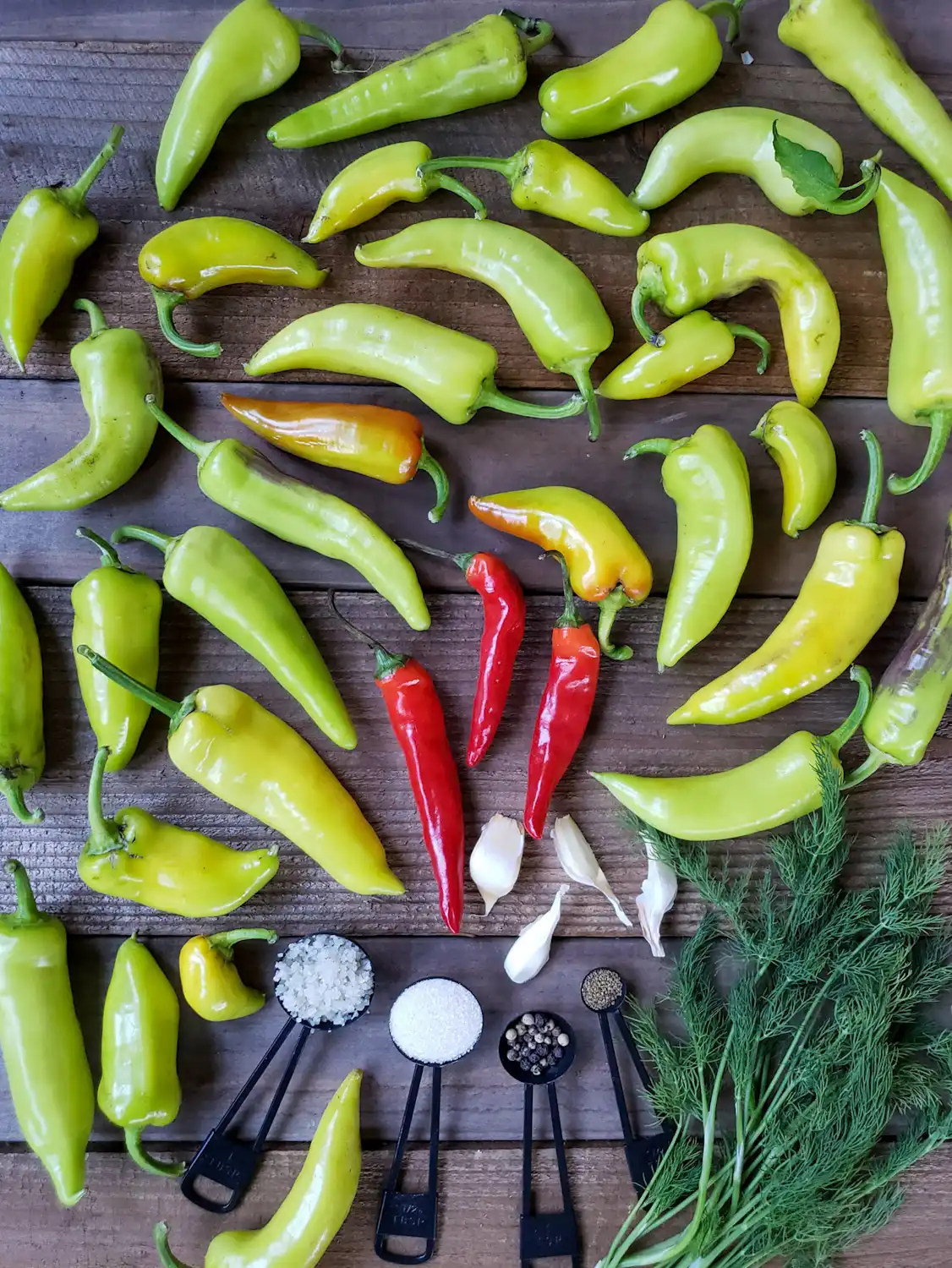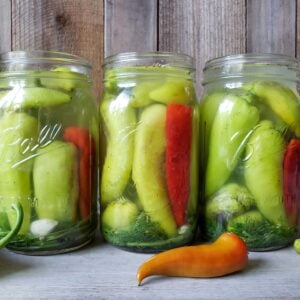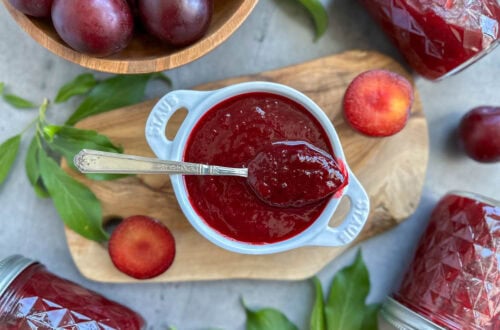Quick & Easy Refrigerator Pickled Peppers Recipe

Got peppers? Come learn how to make our favorite quick-and-easy refrigerator pickled peppers recipe. That’s right, no canning required! Though, you could can them – if you desire. These pickled peppers are delectably tangy, just a tad sweet, and as spicy as you make them. It’s one of our favorite ways to preserve peppers from the garden. I’ve also included tips on how to prevent pickled peppers from getting mushy – just like our popular Easy Crunchy Dill Cucumber Pickles recipe.
What kind of peppers can you pickle?
Truth be told, we grow banana peppers pretty much just to make this recipe! They’re excellent prepared other ways of course, but are exceptional when pickled – much like a classic pepperoncini. However, banana peppers aren’t the only type of pepper that you can use for this refrigerator pickled pepper recipe.
Banana peppers and pepperoncinis are the most popular option, but jalapeños, bell peppers, cayenne peppers, Thai chilis, Hungarian wax peppers, and others can make excellent pickled peppers too. Hot, mild, sweet, savory… pickle whatever variety of pepper your taste buds or garden dictate!
Personally, we like to save our hottest chili peppers to make homemade chili powder or fermented hot sauce instead. If you have a lot of jalapeños on hand, I HIGHLY recommend trying our cowboy candy recipe or hot pepper honey recipe too.
Find our top tips to grow your own peppers here.

Would you like to save this?
Disclosure: Homestead and Chill is reader-supported. When you purchase through links on our site, we may earn an affiliate commission.
INGREDIENTS
Per quart jar, stuffed with peppers of your choice:
- Peppers of choice – the amount will vary, depending on pepper size
- 1 cup of filtered water
- 1 cup of white vinegar
- About a dozen peppercorns
- A few sprigs of fresh dill
- 2 to 3 cloves of garlic, lightly crushed
- 1 heaping tablespoon sea salt and sugar each
- A sprinkle of celery seed
We typically make several quart jars at once, or one large half-gallon jar, so we triple the recipe by combining 3 cups of vinegar, 3 cups of water, 4 tablespoons of salt and sugar each, and just under ½ teaspoon celery seed.
Optional: This pickling recipe can be used for a variety of other veggies too! Feel free to add a few slices of onion, carrots, green beans, or other garden goodies in there too. When we are making pepperoncinis, we like to use mostly all banana peppers, but add at least one hot pepper into each jar for an extra kick!
Vinegar ratio for canning
If you intend to hot-bath can this pickled pepper recipe, increase the vinegar-to-water ratio to a higher amount of vinegar than listed above. For food safety, adjust the recipe to be about 3 times the amount of vinegar to water. For example, 1.5 cups of vinegar and 1/2 cup of water, scaling both up as needed. Also ensure you’re using 5% acidity vinegar or stronger.
How do you make pickled peppers stay crisp?
To keep your refrigerator pickled peppers extra crunchy, you can add couple grape leaves, oak leaves, black tea leaves, blackberry leaves, or horseradish leaves to the jar. All of these leaves contain tannins that help the peppers stay more crisp naturally. I highly suggest adding them if you choose to hot-bath can pickled peppers. The heat will cause them to soften much more than when making refrigerator pickled peppers!
Whole pickled peppers will stay more crisp than cut slices. Also, the more fresh the pepper are, the more crunchy they will stay once pickled. That’s one reason homegrown, just-picked peppers make the best pickles. Peppers from the farmer’s market will also be more fresh and crips than those from the grocery store. Store peppers in the refrigerator immediately after harvesting to retain maximum firmness and freshness. Finally, some folks like to add “pickle crisp” to their homemade pickles peppers (especially when canning).

INSTRUCTIONS
Step 1: Prepare Jars
In the bottom of each glass mason jar (or similar container), add a few sprigs of fresh, washed dill. Peel 2 to 3 cloves of garlic, crush them lightly with the wide side of a knife, and throw them in the jar as well. Finally, add a pinch of peppercorns. We add about a dozen per quart. If you are using grape or oak leaves, add one or two to the bottom of each jar now. We’ve done it both ways, and simply didn’t have any available to use this time!

Step 2: Create A Pickling Brine
On the stovetop, combine equal parts white vinegar and water in a pot. Next, add equal parts sugar and sea salt, plus a sprinkle of celery seed – following the amounts list above. Stir, and lightly heat the mixture until the salt and sugar has dissolved.
We don’t want to add the brine to the peppers when it is piping hot though! “Cooking” the peppers in boiling brine will make them soften or get more mushy. Therefore, allow the brine to cool a bit while you are preparing and packing the peppers in jars. Lukewarm to room temp brine is good.
Step 3: Prepare & Poke Peppers
You have probably noticed that we leave our peppers whole for this refrigerator pickled pepper recipe. We have found that this helps maintain crispness. It also reduces the preparation effort upfront. Later, we can either snack on the pickled peppers whole, or slice them into rings as desired.
Wash your peppers. Keep the stems attached, but feel free to trim them down to a shorter length if they are extra lanky. Next, poke each pepper with a sharp knife in a couple of places. This allows the brine to adequately penetrate and engulf the peppers, seeping in through the small slits you’ve created.

Step 4: Pack Peppers
Now pack those jars! Rather than simply tossing them in there all willy-nilly, I try to carefully and methodically place, pack, and tuck the peppers into the jars in a manner to fit as many as possible, leaving little spare room. Packing them tight also reduces their ability to float, which helps them stay submerged in the brine.

Step 5: Add the Pickling Brine
Once your brine is no longer hot, pour it over each jar stuffed with peppers – until it is completely full and all of the peppers are submerged. You will see the peppers begin to bubble as the brine seeps into the slits you created. After adding a lid, tap and wiggle the jars side to side to encourage that seeping. This will also help knock loose any air bubbles.
If you have any leftover brine, keep it! It will take a couple days for the brine to completely penetrate and fill the peppers. As it does, the brine level in the jar will decrease and need to be topped off. If you do not have any brine leftover, no big deal! Simply top off the jars with plain white vinegar as needed.
Feel your jars. If they’re still rather warm, allow them to sit out at room temperature to cool down for a couple of hours before refrigerating.


Step 6: Refrigerate
After the jars of peppers are fairly cool, add a lid to each jar. The acidic nature of pickles can make standard mason jar lids corrode with time, so we opt to use these BPA-free plastic wide mouth jar lids, or these stainless steel ones.
Store your homemade pickled peppers in the refrigerator and let them sit to marinate. As mentioned above, keep an eye on them for the first couple of days to monitor the brine level! If it drops below the peppers, top them off with more reserved brine or vinegar as needed.
How long should pickled peppers sit before eating?
Now, allow pickled peppers to marinate in the fridge for at least a few days before consuming. There is no harm in tasting them early! Yet for the best flavor and results, let them sit for a week or so. The delicious pickle flavors will only get better with time.
How long do refrigerator pickled peppers last?
These easy refrigerator pickled peppers will stay good for up to 6 months (or longer) in the refrigerator. Technically, they’ll be safe to eat for well over a year – or as long as mold or strong off odors/flavors don’t develop. Yet refrigerator pickled peppers will be the most crisp and enjoyable if consumed within a few months, as the texture will degrade over time.
Are pickled peppers in vinegar shelf stable?
Simple refrigerator pickled peppers in vinegar are NOT shelf stable and should be refrigerated. That is, unless you used the safe vinegar ratio recommended for canning pickled peppers (previously discussed) AND processed them in a hot bath or pressure canner. Then they can be stored at room temperature after canning, but must be refrigerated after opening.

Step 7: Enjoy!
I have always been a pickle-lover, and find myself snacking on these straight from the jar! Pickled peppers make a great addition to any hors d’oeuvre plate, with cheese and crackers, on pizza, tacos, and on sandwiches of course. Because the peppers will be filled with brine, keep that in mind as you plate or bite into them! To easily drain the peppers, you can simply cut (or bite) off the tip.
How do you like to use your pickled peppers?
I hope you enjoy these easy refrigerator pickled peppers as much as we do! Please feel free to ask questions or provide a review in the comments below, and spread the love by pinning or sharing this article.
You may also like:
- How to Grow Peppers and Chilis: Seed to Harvest
- Quick Pickled Dilly Green Beans (Refrigerator or Canning)
- Sweet & Spicy Pepper Fermented Hot Sauce Recipe
- How to Make Homemade Chili Powder in 4 Simple Steps (Dried Chili Peppers)
- Easy Lacto-Fermented Dill Cucumber Pickles Recipe
- Quick Pickled Red Onions (Easy Refrigerator Pickled Onions)

Easy Refrigerator Pickled Pepper Recipe
Ingredients
- Peppers of choice
- 1 cup Filtered water
- 1 cup White vinegar
- 1 tbsp Sea salt, kosher or pickling
- 1 tbsp Sugar
- Fresh dill, a few sprigs (small handful)
- 2-3 cloves Fresh garlic, light crushed
- Peppercorns, to taste (about a dozen per jar)
- 1 pinch celery seed
- 1 grape, horseradish, oak or black tea leaf (optional, to preserve maximum pepper crunch)
Instructions
- Add the fresh dill, cloves of crushed garlic, celery seed and peppercorns to the bottom of a jar (and an optional grape, horseradish, black tea or oak leaves for extra crunch).
- Prepare the brine by adding the vinegar, water, sugar, and salt in a saucepan on the stovetop. Heat until the sugar and salt dissolve, but then allow the brine to cool slightly before adding to peppers.
- Wash the peppers. Poke each pepper with a sharp knife in a couple places to allow the brine to penetrate the peppers.
- Carefully pack the peppers into the jar, trying to fit as many as possible inside.
- Pour the brine over the top of the peppers until they are completely submerged. Top off with more brine or vinegar if settling occurs.
- Add a lid to the jar and refrigerate for 2 to 3 weeks before enjoying. Use within 6 months for best quality and flavor.
Notes
|








82 Comments
Debbie
What about the seeds in the peppers???? I don’t eat those….
Aaron (Mr. DeannaCat)
Hey Debbie, no problem if you don’t want to eat the seeds, just be sure to remove the seeds from the peppers either before you pickle them or upon serving them. This can be accomplished by slicing the pepper lengthwise along its side and removing the seeds from there. Or you can cut off the top stem portion of the pepper to scrape or scoop out the seeds from the top. Enjoy!
Stacey
Can u store these on a shelf or do they have to b refrigerated
DeannaCat
Hi Stacey – This particular recipe is for refrigerator pickles, but I did include notes on how to increase the vinegar to water ratio if you’d like to hot-bath can them to store at room temperature in the instructions!
Kim Williams
Hi Deanna, I was wondering if you have to use fresh dill for this recipe? I’m having a hard time finding it. I have dried dill, could that be used?
DeannaCat
Hi Kim – We’ve always used fresh so I can’t say exactly how the final results will be with dry, but I know plenty of people use dry herbs in their pickle recipes! You’ll want to scale back however. The usual recommendation is to use about 1/3 the amt of dry herb than you would fresh. I found this recommendation: For a 3-5″ (8 to 12 cm ) sprig of fresh dill, you can substitute 1/4 teaspoon of dried dill weed. The National Center for Home Food Preservation says, “For each quart, try 3 heads of fresh dill or 1 to 2 tablespoons dill seed (dill weed = 2 tablespoons).” I hope that helps!
Terra
We have now used this recipe twice, and it is amazing! I loved it so much I made a jar of pickled peppers for my parents and my brother! This is a keeper!
Brooke
I made these beauties a few weeks ago for the first time. After a few days, I cracked open my first jar (shhhhh…..) and they were magnificent! My mom usually buys some those pickling packets from the grocery store, but this is so soooo soooooo simple and just better all around, you really feel much better when it is homemade. I already had everything I needed, though I could couldn’t find my celery seed, it still turned out splendid. I made a few jars of banana peppers with a few jalapeños and another jar with cucumbers. I added onion slices, pearl onions, and fresh cilantro to some. Today, I am planning to make another batch with peppers, cukes, and carrots my sister gifted me from her garden. I eat my snacks, salads, and homemade pizzas with happiness and a sense of pride. Thank you for this super simple, yet effective recipe.
Nicole Novak
I just made them for the second time!! The pepper gods have been good and my peppers runneth over. This time I used sweeeeeeeeet Orange Tangerines, Jimmy Nardello and then semi-hot Pepperoncini Cherry Chiles. The latter came from seeds brought to me from Italy last spring. I also added a couple of Bhutan Chiles that have some serious heat. It’s simply AMAZING how good these are! Thanks again for the recipe!
Megan S
Just got these in the fridge! I’m trying jalapeño slices. Can’t wait for them to be ready! Thanks!
Terra
We have now used this recipe twice, and it is amazing! I loved it so much I made a jar of pickled peppers for my parents and my brother! This is a keeper!
Karyn
Can you use the refrigerated pickled peppers to make stuffed peppers at a later time? Sounds like they maintain a firm texture (unlike freezing)? I have so many and I like making stuffed peppers but we can only eat so many! 😊 Thank you.
Aaron (Mr. DeannaCat)
Hi Karyn, that sounds delicious! Though the pickled peppers do become less crisp with time, I am sure they will be more firm than peppers from the freezer.
Lisa
Hi Deanna!
Thanks for the great post! What kind of white vinegar should be used for this?
Thanks!
DeannaCat
Hi Lisa! Just your average basic distilled white kitchen vinegar! 🙂
Lisa
Your posts are always so timely! I’ve got a bunch of peppers to pick and now I can pickle them 🙂
DeannaCat
Lisa – I am glad this came at the right time! Pepper season is upon us! 🙂 I hope you enjoy it.
Kelly Nordwall
This looks good and so easy! Do you need to add sugar? Thank you for all that you share!
DeannaCat
Hi Kelly, No you don’t have to add the sugar! We just find it brings a nice balance to the recipe. And trust me, we aren’t “sweets” fans! Many other recipes call for a lot more! I hope you enjoy it, either way.
Brittney Plummer
You must have been reading my mind! I’m making theSe tomorrow!!💚👌🏽